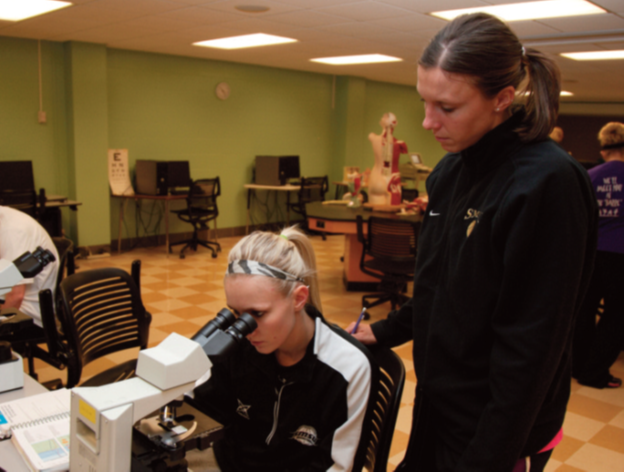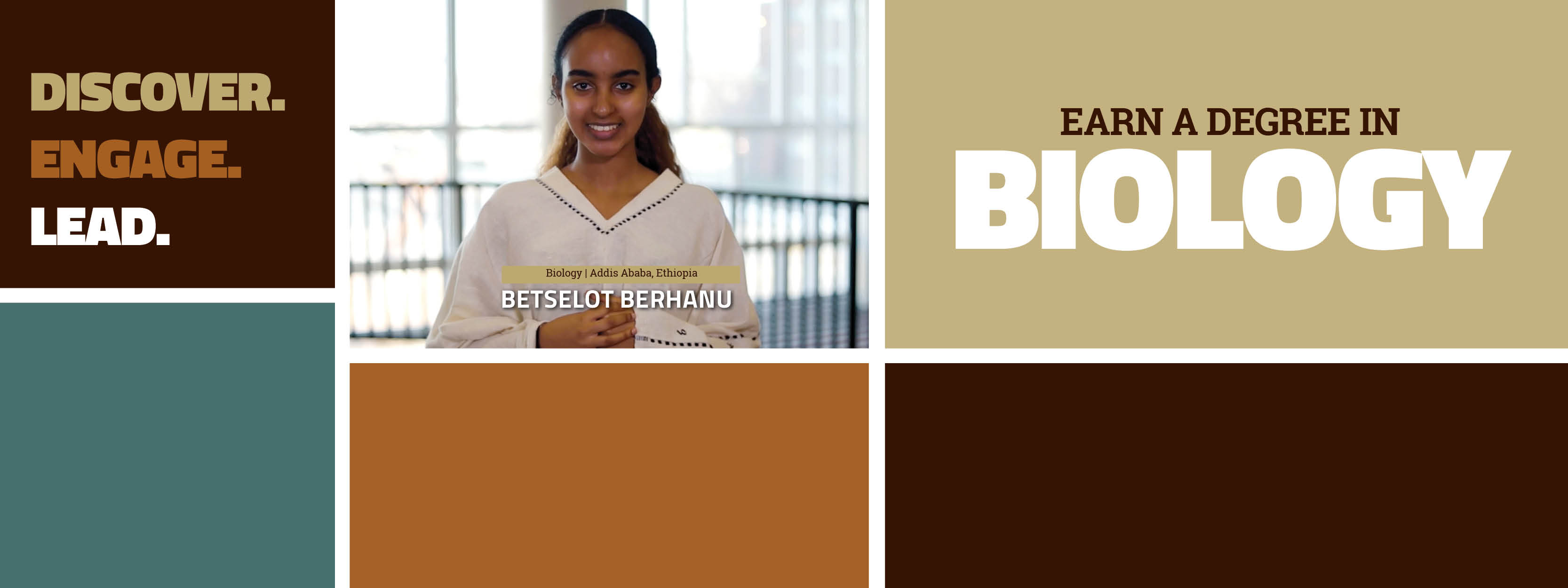Biology
About the Program
Southwest Minnesota State University’s Biology Program is broadly based in biology, the supporting sciences (e.g. Chemistry, Environmental Science, Physics) and math. Research experiences are embedded into the curriculum so that all students get the opportunity to perform independent research projects and formally present their results at SMSU’s annual Undergraduate Research Conference. Students pursuing a Biology major may choose from the following three emphasis areas: Medical and Health Sciences, Ecology/Wildlife Biology, or General Biology. Students can also major in Biology Education or Medical Laboratory Science (MLS). The biology major is designed to prepare students for a variety of careers in medicine, health care, government, industry, and environmental fields.
SMSU Biology faculty, rather than teaching assistants, teach all of the classes and labs; small class and lab sizes promote individualized, active learning experiences. Biology faculty play a major role in advising and teaching students in pre-professional programs. Biology majors satisfy the pre-professional requirements for acceptance into medicine, chiropractic, physical therapy, optometry, dentistry, occupational therapy, physician assistant, veterinary, pharmacy and osteopathic programs. Biology majors often continue their studies at the graduate level.
See the Program Goals and Student Learning Outcomes for Biology.

Facilities
The program is housed in the Science/Math and the Science/Technology Buildings. The facilities include six teaching/research laboratories, a media/solutions preparation lab, a GIS lab, greenhouse, natural history museum, and an on-campus 40-acre Wildlife Area. Students gain hands-on experience with a variety of instrumentation including camera and Wi-Fi enabled compound and dissecting microscopes, a virtual cadaver table, PCR/qPCR, centrifuges, growth chambers, physiology powerlabs, spectrophotometers, Valve Index Full Virtual Reality kits, and more!

Majors & Minors
- Major - Bachelor of Science: Biology
- Major - Bachelor of Arts: Biology
- Major - Bachelor of Arts: Medical Laboratory Science
- Major - Bachelor of Science: Biology Education*
- Minor - Biology
-
Many Biology students double-major or pursue minors in related fields such as Chemistry, Environmental Science, Environmental Education, or Exercise Science, among others.
-
- Pre-Professional Programs
Clubs & Organizations
Undergraduate Research Conference
The Undergraduate Research Conference (URC) was established in 2006 for science majors to engage in a professional exchange of scientific ideas, as well as a means to showcase and celebrate their hard work and accomplishments. The URC is held annually on campus to include all disciplines across campus and continues to grow each year as we celebrate the intellectual achievements of our students.
Research is such an integral part to learning science that the biology program embedded research experiences throughout the four year core curriculum so that ever student gets this opportunity. Students must use scientific literature to create research proposals, design and carry out experiments, analyze data, and present their findings during the URC. These experiences are beneficial when students begin applying for jobs, graduate schools, or professional healthcare programs.
Activities
Biology majors can involve themselves in many activities that help them gain experience within their field. Students have the opportunity to work as lab assistants in the Biology Lab-Prep Room, help in the greenhouse, or create educational displays in our Natural History Museum. The Biology Club has programs and activities to serve as social and academic focuses for departmental majors and pre-professional students. Many area businesses and healthcare providers provide internships, part-time jobs, and job shadowing experience for our students.
Career Opportunities
Graduates may choose from a number of careers after obtaining a B.A. or B.S. degree in biology. The biology education major, which includes course work from the Education Department, prepares the graduate for a teaching career at the secondary level. The MLS major is based on three years of coursework at SMSU and one year of clinical training at the Sanford USD Medical Center (Sioux Falls, South Dakota). Completion of the clinical internship prepares the graduate for the national licensing exam leading to a career as a Medical Laboratory Scientist.
- Biochemist
- Wildlife Biologist
- Health Professions
- Biomedical research
- Microbiologist
- High School life science teacher
- Medical laboratory scientist
Contact Information
Biology Program - Office
SM 178, Southwest Minnesota State University
1501 State St.
Marshall, MN 56258
- Telephone: 507-537-6178
- Fax: 507-537-6151
- Email: Science@smsu.edu
FRESHMAN ADMISSION PROCESS
- Complete Application
- $20 Non-refundable Application Fee
- Official High School Transcript(s)
- ACT or SAT Test Scores
FRESHMAN ADMISSION REQUIREMENTS
- Rank in the upper half of graduating class
- or
- Score a composite of 21 or above on the ACT or 990 on the SAT
Last Modified: 1/22/25 11:06 AM | Website Feedback



